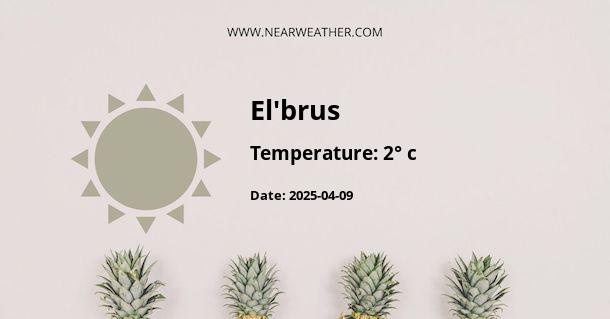Weather
-10° 
Climate Conditions: light snow
Humidity: 98%
Wind speed: 8.86 km/h
Wind direction: 176°
Daily Weather Forecast
Sunday
01/18/2026
Climate Conditions: light snow
Humidity: 98%
Monday
01/19/2026
Climate Conditions: light snow
Humidity: 98%
Tuesday
01/20/2026
Climate Conditions: light snow
Humidity: 99%
Wednesday
01/21/2026
Climate Conditions: overcast clouds
Humidity: 100%
Thursday
01/22/2026
Climate Conditions: clear sky
Humidity: 73%
Friday
01/23/2026
Climate Conditions: broken clouds
Humidity: 61%
Evolution
Daily Weather Forecast Evolution (°C)
Lowest temperature
Highest temperature
Other Information
Sunrise
07:37
Sunset
17:01
Latitude
43.257702
Longitude
42.644348
Timezone: GMT+05:30
More about El'brus:
Climate and Weather in Elbrus, Russia
Elbrus, located in the Caucasus Mountains in southern Russia, is known for its stunning natural beauty and challenging mountaineering opportunities. Understanding the climate and weather conditions in this region is essential for visitors and mountaineers planning their trips. Here, we will delve into the year-round weather patterns, average temperatures, precipitation levels, and other important climatic factors that shape Elbrus's unique environment.Geographical Location
Elbrus is situated on the northern slopes of the Greater Caucasus Mountain Range, close to the border between Russia and Georgia. It is the highest peak in the Caucasus Mountains and in Europe, standing at an impressive elevation of 5,642 meters (18,510 feet). Its location in the mountainous region greatly influences its climate, resulting in distinct weather patterns throughout the year.Seasonal Weather Patterns
Elbrus experiences four distinct seasons: spring, summer, autumn, and winter. Let's explore each season's weather characteristics in detail.Spring (March - May)
During spring, Elbrus transitions from the cold winter months to milder temperatures. However, it is important to note that the higher altitudes of the mountain can still experience freezing temperatures and snowfall during this season. The average temperatures range from 5°C (41°F) to 15°C (59°F) in the lower elevations, while the higher slopes may experience temperatures below freezing. It is recommended to pack warm clothing and be prepared for sudden weather changes during this time of the year.Summer (June - August)
Summer in Elbrus is relatively short but offers the most favorable weather conditions for mountaineering and outdoor activities. The lower elevations experience pleasant temperatures, ranging from 15°C (59°F) to 25°C (77°F). However, as you ascend the mountain, temperatures drop significantly, and the higher slopes remain covered in snow and ice. It is crucial to be equipped with appropriate gear and clothing, as weather conditions can change rapidly in the mountains.Autumn (September - November)
Autumn in Elbrus brings cooler temperatures and the onset of snowfall in the higher altitudes. The lower elevations experience temperatures ranging from 5°C (41°F) to 15°C (59°F), while the peaks can have temperatures below freezing. It is advisable to check weather forecasts and pack accordingly, as the weather becomes more unpredictable during this season.Winter (December - February)
Winter in Elbrus is characterized by extremely cold temperatures and heavy snowfall, making it a challenging time for mountaineering. The lower elevations experience temperatures ranging from -10°C (14°F) to -5°C (23°F), while the higher slopes can have temperatures as low as -30°C (-22°F) or even lower. It is essential to have proper winter gear, including insulated clothing and equipment, to ensure safety and comfort during winter ascents.Precipitation and Weather Extremes
Elbrus receives a significant amount of precipitation throughout the year, primarily in the form of snow. The higher elevations can experience heavy snowfall, especially during the winter months. The average annual precipitation in the region is around 1,200 millimeters (47 inches), with the majority falling between November and April. Elbrus is also prone to weather extremes, including strong winds and storms. Mountaineers and visitors must be aware of these conditions and plan their trips accordingly, taking necessary precautions and seeking expert advice.Climate Chart and Average Temperatures
To provide a visual representation of Elbrus's climate, we have prepared a climate chart showcasing the average temperatures and precipitation levels throughout the year.| Month | Average Temperature (°C) | Precipitation (mm) |
|---|---|---|
| January | -10 | 50 |
| February | -8 | 40 |
| March | -5 | 60 |
| April | 0 | 70 |
| May | 5 | 80 |
| June | 10 | 90 |
| July | 15 | 90 |
| August | 14 | 80 |
| September | 10 | 70 |
| October | 5 | 60 |
| November | -2 | 50 |
| December | -7 | 40 |
Conclusion
Elbrus's climate is influenced by its mountainous location, resulting in unique weather patterns and conditions throughout the year. While the lower elevations experience milder temperatures, the higher slopes can be harsh and challenging. Visitors and mountaineers should equip themselves with appropriate clothing, gear, and knowledge of the local weather conditions to ensure a safe and enjoyable experience in this magnificent region.FAQ's about El'brus's Weather:
Q - What is the Latitude and Longitude of El'brus?
A - El'brus's Latitude is 43.257702 & Longitude is 42.644348.
Q - What is the weather in El'brus today?
A - Weather in El'brus is -10° today.
Q - What is the climatic condition of El'brus today?
A - Climate Conditions in El'brus shows light snow today.
Q - What is the humidity in El'brus today?
A - Humidity in El'brus is 98% today.
Q - What is the wind speed in El'brus today?
A - Wind speed in El'brus is 8.86 km/h, flowing at 176° wind direction. today.

Nearby Locations
Latest searched locations